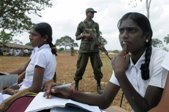Many an eyebrow has been raised over contradiction by British High Commissioner John Rankin of President Mahinda Rajapaksa’s claim of scaling down of the military presence and the non-involvment of the military in civil administration in the Northern Province since the conclusion of the conflict.
In his video, ‘Ask the High Commissioner’, Rankin challenged a claim by President Mahinda Rajapaksa in his address to the nation on May 19, on the third anniversary of Sri Lanka’s war victory over the LTTE.
Rankin discussed the human rights situation in Sri Lanka with reference to the Lessons Learnt and Reconciliation Commission (LLRC) report as well as the recently launched UK Human Rights Report. Categorizing Sri Lanka as one of the 28 countries accused of major human rights violations, Rankin stressed the need for freedom of expression, minority rights, women rights while condemning the country for continuing abductions and disappearances.
Commenting on President’s assertion that the armed forces couldn’t be moved out of the Northern and Eastern Province due to the continued anti-Sri Lanka operations undertaken by the Tamil Diaspora and the LTTE rump abroad, Rankin said that the LTTE was no longer engaged in terrorist activity. He described the absence of terrorism as a good thing, while reminding the GoSL that the LTTE remained a proscribed organization in many parts of the world, including in the UK.
HC Rankin said that President Rajapaksa had, in his Victory Day speech, declared that the military was no longer involved in civil administration in the Northern and Eastern parts of the country. Recognizing Sri Lanka’s right to maintain normal military bases throughout the country, like in the UK, he alleged that the military deployment in the Northern and Eastern Province was very much different than that in other parts of the country. Rankin alleged that the government was maintaining a very heavy military presence in the Northern Region.
President Rajapaksa said: We are aware that the armed forces do not participate in the administration of the North or East. These regions are administered by the public service and the police. Despite this, there are many who shout that the security forces’ camps in these areas should be removed. They ask us why they are not removed. But no one asks whether those who make such demands are not seeking to achieve what Prabhakaran failed to obtain through the use of shiploads of arms, aerial attacks, sea tiger and human suicide bomb attacks through 30 years of war of terror. Are they now not asking this through different means?”
Jaffna Security Forces Commander Major General Mahinda Hathurusinghe yesterday told The Island that since the conclusion of the conflict there had been a steady reduction of military presence in the Jaffna peninsula. He revealed that at the time he took over the peninsula on Dec. 7, 2009, there had been 27,000 troops, though today there were only 15, 600. “There are three Divisions deployed across the peninsula and Jaffna islands. The 51 Div is deployed in Jaffna sector, 52 Div in Vadamaratchchy and 55 Div at Elephant Pass. Don’t forget at the time eelam war IV erupted the Jaffna peninsula had the largest single concentration of armed forces and police numbering close to 50,000.”
By Shamindra Ferdinando
IS
